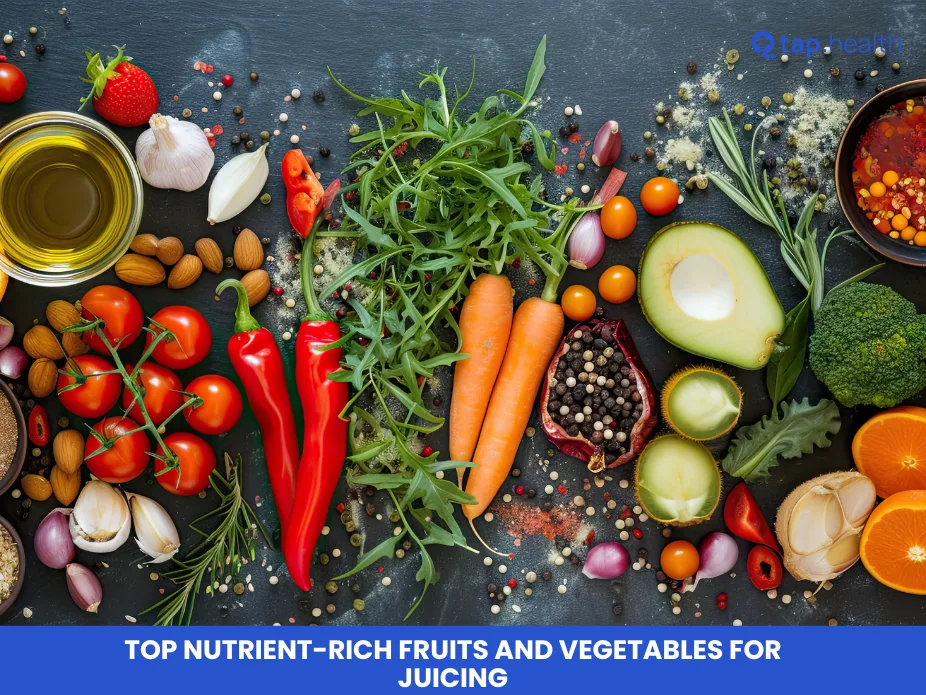Juicing has become a go-to habit for health-conscious people across India—and for good reason. A fresh glass of juice made from real fruits and vegetables can flood your body with vitamins, minerals, antioxidants, and enzymes that support energy, immunity, digestion, and glowing skin. But not all produce is created equal when it comes to juicing. Some fruits and veggies are bursting with nutrients, while others are mostly water or sugar.
If you’re wondering which fruits and vegetables give you the most bang for your buck in a juice, you’ve come to the right place. In this guide, we’ll walk you through the top nutrient-rich fruits and vegetables for juicing, explain why they’re so powerful, and share practical tips to get the most out of your juicer—without wasting money or nutrients.
Why Juicing Nutrient-Rich Produce Matters
Before we list the best fruits and veggies, let’s understand why nutrient density matters in juicing.
When you juice, you’re removing the fibre but keeping the liquid packed with vitamins, minerals, and plant compounds. This makes nutrients easier and faster for your body to absorb—great for quick recovery, detox, or giving your system a nutrient boost.
However, if you juice mostly sugary fruits like mango or grapes without balancing them with greens or low-sugar veggies, you might end up with a drink that spikes your blood sugar and lacks essential micronutrients.
That’s why choosing nutrient-rich (not just tasty) produce is key. Nutrient-rich means high in vitamins, minerals, antioxidants, and phytonutrients per calorie or per gram.
According to the USDA and India’s National Institute of Nutrition (NIN), the most nutrient-dense foods include leafy greens, cruciferous vegetables, citrus fruits, and deeply coloured produce like beetroot and berries.
Best Nutrient-Rich Vegetables for Juicing
Vegetables form the backbone of any healthy juice. They’re low in sugar, high in minerals, and loaded with disease-fighting compounds. Here are the top picks:
Spinach
Spinach is a juicing superstar. It’s mild in flavour, blends well with almost anything, and is packed with iron, folate, vitamin K, vitamin A (as beta-carotene), and magnesium.
Why juice it?
- Supports healthy blood and oxygen transport (thanks to iron and folate)
- Great for eye health (vitamin A)
- Anti-inflammatory due to antioxidants like lutein and zeaxanthin
Tip: Always use fresh, organic spinach if possible. Non-organic may contain pesticide residues. Rinse thoroughly before juicing.
Kale
Kale is often called a “superfood,” and for good reason. It’s one of the most nutrient-dense vegetables on the planet.
Key nutrients:
- Vitamin C (more than an orange per 100g!)
- Vitamin K (essential for blood clotting and bone health)
- Calcium, potassium, and fibre (though fibre is lost in juicing, the minerals remain)
- Sulforaphane—a powerful anti-cancer compound
Juicing note: Kale has a strong, slightly bitter taste. Mix it with apple, lemon, or cucumber to balance the flavour.
Carrots
Carrots are a juicing classic in Indian households—and rightly so. They’re sweet, widely available, and incredibly rich in beta-carotene (which your body converts to vitamin A).
Benefits of carrot juice:
- Boosts vision and skin health
- Supports immune function
- Contains antioxidants like lutein and lycopene (especially in red or purple varieties)
Pro tip: Add a pinch of black pepper or a teaspoon of healthy fat (like coconut oil) to help your body absorb fat-soluble vitamin A better—even in juice form.
Beetroot
Beetroot juice is deep red, earthy, and packed with unique nutrients like betalains—antioxidants that give beets their colour and have anti-inflammatory properties.
Why it’s great:
- Lowers blood pressure (due to natural nitrates that improve blood flow)
- Supports liver detoxification
- Rich in folate, manganese, and potassium
Caution: Beet juice can temporarily turn your urine pink (harmless, called beeturia). Start with small amounts—½ beet per juice is enough.
Cucumber
Cucumber may seem “watery,” but it’s actually a great base for juices. It’s hydrating, low in calories, and contains silica—a mineral that supports skin, hair, and nail health.
Bonus: Cucumber juice helps flush out toxins and reduces bloating. It’s also cooling—perfect for Indian summers.
Celery
Celery juice has gone viral globally, and while some claims are exaggerated, it is nutrient-rich.
What’s in it?
- Electrolytes like potassium and sodium (great for hydration)
- Vitamin K and antioxidants like apigenin (anti-inflammatory)
- Natural nitrates that support circulation
How to use: Juice 2–3 stalks with lemon and ginger for a refreshing, gut-friendly drink.
Wheatgrass
Though not a vegetable in the traditional sense, wheatgrass is often juiced for its intense nutrient profile.
Per 30ml shot:
- High in chlorophyll (supports detox and oxygenation)
- Rich in vitamins A, C, and E
- Contains all essential amino acids
Note: Use a masticating juicer or buy fresh wheatgrass shots. Blenders won’t extract the juice properly.
Best Nutrient-Rich Fruits for Juicing
Fruits add natural sweetness and vital vitamins to your juice. But choose wisely—some are high in sugar with fewer nutrients. Focus on these:
Lemon
Lemon isn’t typically juiced alone, but it’s a powerhouse addition.
Why add lemon?
- Boosts vitamin C (supports immunity and iron absorption)
- Alkalises the body (despite being acidic)
- Aids digestion and liver function
Tip: Always juice the whole lemon (peel removed) for maximum flavonoids. Add to green juices to cut bitterness.
Oranges
Oranges are rich in vitamin C, folate, and potassium. Fresh orange juice (without added sugar) is far healthier than packaged versions.
Health perks:
- Strengthens immunity
- Supports heart health
- Hydrating due to high water content
Caution: Orange juice is high in natural sugars. Limit to 1 medium orange per serving, and pair with veggies to balance.
Apples
Apples are the most common juicing fruit in India—they’re sweet, affordable, and blend well.
Nutrients:
- Vitamin C
- Polyphenols (antioxidants like quercetin)
- Boron (supports bone health)
Best practice: Use green apples (like Granny Smith) over red—they’re lower in sugar and higher in antioxidants.
Pomegranate
Pomegranate juice is a ruby-red elixir packed with punicalagins—potent antioxidants that fight inflammation and oxidative stress.
Benefits:
- Supports heart health (lowers blood pressure and LDL cholesterol)
- May improve memory and joint health
- Rich in vitamin K and folate
Juicing tip: Only juice the arils (seeds). The white pith is bitter. A manual citrus press works well.
Berries (Strawberries, Blueberries, Amla)
Berries are among the most antioxidant-rich fruits on earth.
- Strawberries: High in vitamin C and manganese
- Blueberries: Loaded with anthocyanins (brain-boosting antioxidants)
- Amla (Indian gooseberry): One of the richest natural sources of vitamin C in the world—used in Ayurveda for centuries
How to juice: Berries have low juice yield. Blend with water and strain, or add small amounts to veggie juices for flavour and nutrients.
Papaya
Papaya contains papain—an enzyme that aids digestion—and is rich in vitamin A, C, and folate.
Great for:
- Gut health
- Skin glow
- Reducing inflammation
Note: Use ripe papaya for sweetness. Unripe papaya is too bitter for juicing.
Which Fruits and Vegetables Should You Avoid Juicing?
Not everything belongs in your juicer. Here’s what to skip or limit:
Bananas
Bananas don’t juice well—they’re too thick and starchy. They turn into a paste, not liquid. Better to blend them in smoothies.
Avocados
Same issue—high fat, low water content. They don’t yield juice. Stick to blending.
Mangoes and Grapes
Delicious, yes—but very high in natural sugar. Juicing them removes fibre, causing rapid blood sugar spikes. If you use them, limit to 2–3 chunks per glass and always pair with greens.
Starchy Vegetables (Potatoes, Sweet Potatoes)
These don’t juice efficiently and can cause digestive discomfort when raw. Cook them instead.
How to Maximise Nutrient Retention While Juicing
Juicing can destroy some nutrients if done wrong. Follow these tips to keep your juice as nutritious as possible:
Use a Masticating (Cold-Press) Juicer
Centrifugal juicers generate heat and oxidation, which degrade sensitive vitamins like C and enzymes. Masticating juicers crush and press slowly, preserving more nutrients.
Drink Immediately
Nutrients start degrading the moment juice is exposed to air. Drink within 15–20 minutes for best results. If you must store, use an airtight glass jar filled to the top and refrigerate for max 24 hours.
Don’t Peel Everything
Many nutrients are in or just under the skin (e.g., apples, cucumbers). Wash well and juice with peel—unless it’s waxed or non-organic.
Rotate Your Produce
Don’t juice the same 3 ingredients every day. Rotate greens, fruits, and roots to get a wider range of nutrients and avoid overexposure to natural plant toxins (like oxalates in spinach).
Common Juicing Mistakes to Avoid
Even healthy habits can go wrong. Watch out for these errors:
Overloading on Fruit
A juice with 2 apples, an orange, and a carrot may taste great—but it’s basically sugar water. Aim for an 80:20 ratio—80% vegetables, 20% fruit.
Ignoring Oxalates and Goitrogens
Spinach and beet greens are high in oxalates, which can contribute to kidney stones in susceptible people. Kale and cabbage contain goitrogens, which may affect thyroid function if consumed raw in huge amounts. Solution? Rotate your greens and cook some of them.
Juicing as a Meal Replacement Long-Term
Juice lacks protein, healthy fats, and fibre—essential for satiety and balanced nutrition. Use juice as a supplement, not a sole source of meals, unless under medical supervision.
Can Juicing Replace Whole Fruits and Vegetables?
No—and it shouldn’t.
The Indian Council of Medical Research (ICMR) recommends at least 400g of fruits and vegetables daily—preferably whole. Juicing removes fibre, which is crucial for gut health, blood sugar control, and cholesterol management.
Think of juicing as a nutrient booster, not a replacement. Have your juice in the morning, but still eat salads, cooked sabzis, and whole fruits throughout the day.
Best Juice Combinations for Specific Health Goals
Want to target a particular benefit? Try these blends:
For Glowing Skin
- Carrot + beetroot + orange + lemon
- Cucumber + spinach + amla
For Immunity Boost
- Amla + orange + ginger + turmeric
- Kale + apple + lemon
For Detox & Liver Support
- Beetroot + lemon + ginger + mint
- Wheatgrass + cucumber + celery
For Energy & Hydration
- Coconut water + cucumber + mint + lime
- Watermelon + celery + lemon (great post-workout)
Is Store-Bought Juice as Good as Homemade?
Not even close.
Most packaged “fruit juices” in India contain added sugar, preservatives, and only 10–30% real juice. Even “100% juice” is often pasteurised, which destroys heat-sensitive nutrients.
Homemade juice is fresh, raw, and free from additives. Plus, you control the ingredients.
If you must buy, look for cold-pressed, unpasteurised juices with no added sugar—but they’re expensive and rare outside metro cities.
How Often Should You Juice?
There’s no one-size-fits-all answer. For most people:
- Daily: 1 small glass (200–250ml) of veggie-heavy juice is safe and beneficial
- Occasionally: Use juice as a pick-me-up during illness, travel, or busy days
- Juice cleanses: Not recommended without professional guidance. Short 1–3 day cleanses may be okay for healthy adults, but long-term fasting on juice can lead to nutrient deficiencies.
Listen to your body. If you feel bloated, tired, or dizzy, ease off.
Juicing on a Budget: Smart Tips for Indian Households
Juicing doesn’t have to be expensive. Try these hacks:
- Buy seasonal produce (e.g., carrots in winter, cucumber in summer)
- Use local greens like bathua, mint, or curry leaves—they’re cheap and nutrient-rich
- Grow your own wheatgrass or microgreens on a windowsill
- Use leftover veggie peels (washed) for broth, not juice—but don’t waste edible parts
A simple juice of carrot + beet + ginger + lemon costs less than ₹30 and delivers massive nutrition.
Real-Life Scenario
Consider Priya, a 32-year-old professional struggling with low energy and irregular meals. She began incorporating fresh juices into her daily routine using spinach, carrots, and oranges. Within a few weeks, she noticed improved energy levels, better digestion, and a boost in her immunity. This real-life example highlights how a nutrient-rich juice regimen can complement a busy lifestyle, especially when whole fruits and vegetables are challenging to consume consistently.
Expert Contribution
Nutritionists and dietitians often emphasize the importance of juicing as part of a balanced diet. According to Dr. Anjali Mehta, a certified nutritionist, “Juicing can help people increase their intake of vitamins, minerals, and antioxidants, especially for those who struggle to consume enough whole vegetables and fruits daily. However, it’s important to balance juices with fiber-rich whole foods to maintain digestive health.”
Experts also recommend rotating ingredients to ensure a wide variety of nutrients, which supports long-term health benefits and prevents monotony in taste.
Recommendations Grounded in Proven Research and Facts
Research supports the inclusion of fruits and vegetables in daily diets for disease prevention and improved overall health. Key recommendations include:
- Balance Juice with Fiber – Blend some ingredients rather than fully juicing to retain fiber.
- Focus on Variety – Use a wide range of colors and types of produce to maximize nutrient intake.
- Limit Added Sugar – Stick to natural fruits and vegetables without adding sweeteners.
- Fresh is Best – Consume juices immediately to preserve vitamins and antioxidants.
- Moderation Matters – Juices are supplements, not replacements, for whole meals.
A study published in the Journal of Nutrition (2022) found that individuals who consumed a combination of leafy greens, berries, and citrus fruits had improved antioxidant levels and reduced markers of inflammation compared to those who consumed a standard diet.
FAQs About Nutrient-Rich Fruits and Vegetables for Juicing
Q1: Can I juice every day?
Yes, but keep it balanced. Stick to mostly vegetables with a small amount of fruit. Don’t replace meals with juice unless advised by a doctor.
Q2: Which juice is best for weight loss?
No juice “burns fat,” but low-calorie, high-nutrient juices like cucumber-celery-lemon or kale-spinach-apple can support weight loss by reducing cravings and improving digestion. Remember: juice still has calories.
Q3: Is it okay to juice on an empty stomach?
Yes! Many people prefer morning juice on an empty stomach for better absorption. Just avoid very acidic juices (like pure lemon) if you have acidity or ulcers.
Q4: Do I lose fibre when I juice?
Yes. Juicing removes insoluble fibre. If you want fibre, opt for blending (smoothies) instead. But juicing gives you a concentrated dose of vitamins—both have their place.
Q5: Can diabetics juice?
Yes, but carefully. Avoid fruit-heavy juices. Stick to low-glycemic veggies like spinach, cucumber, celery, and bottle gourd (lauki). Always monitor blood sugar and consult your doctor.
Q6: What’s better—juicing or eating whole fruits and vegetables?
Whole produce is better for daily nutrition due to fibre. Juicing is a great supplement for extra nutrients, especially if you struggle to eat enough veggies.
Q7: How much juice should I drink per day?
200–250ml (1 glass) is sufficient for most adults. More isn’t always better—excess juice can lead to sugar overload or digestive issues.
Q8: Can I add spices or herbs to my juice?
Absolutely! Ginger, turmeric, mint, coriander, and curry leaves boost flavour and health benefits. Turmeric with black pepper enhances absorption.
Q9: Are organic fruits and vegetables necessary for juicing?
Not mandatory, but recommended—especially for thin-skinned produce like spinach, apples, and cucumbers. Pesticides concentrate in juice when fibre is removed. If organic isn’t available, wash thoroughly with vinegar or baking soda.
Q10: Can kids drink vegetable juice?
Yes! Start with mild blends like carrot-apple or cucumber-mint. Avoid strong greens like kale initially. Juice can be a sneaky way to get nutrients into picky eaters—but don’t let it replace whole foods.
Final Thoughts
Juicing, when done right, is a simple and powerful way to flood your body with nature’s best nutrients. By focusing on nutrient-rich fruits and vegetables—like spinach, kale, carrots, beets, lemons, amla, and berries—you can create delicious, health-boosting drinks that support everything from immunity to glowing skin.
Remember: balance is key. Keep sugar low, variety high, and freshness non-negotiable. And never forget—juice complements your diet; it doesn’t replace the joy and nourishment of eating whole, home-cooked meals.
So grab your juicer, head to the local sabzi mandi, and start experimenting. Your body will thank you—one vibrant glass at a time.



